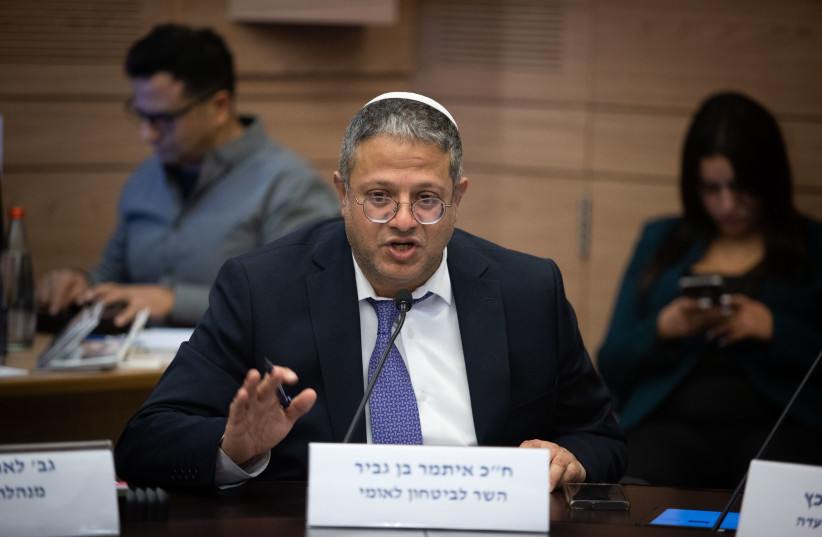National Security Minister Ben-Gvir's behavior over the past few days suggests that he may be intentionally inflating his prime-time spats with the attorney-general and Israel Police commissioner in order to draw attention away from what many claims is his poor performance so far in fighting crime and terror.
This suggestion first came from a source in the Likud, and there is evidence to support it.
The National Security Minister has been very vocal about his policies regarding the broad protests against the government's judicial reforms. He has repeated over and over again, on nearly every television and many radio news outlets, that he supported "equal demonstrations for all" and opposed what he argued was the soft treatment of the current protests, specifically their attempts to block Ben Gurion International Airport and success in blocking Ayalon Highway.
The issue led him to make an early announcement of the removal of Tel Aviv police district chief Ami Eshed from his position. The move was intended to occur after Ramadan, and was police commissioner Koby Shabtai's initiative, due to his sour relationship with Eshed.
Strategetic uproar
The announcement itself did not change this. But what the timing did do was create an uproar over the connection between Ben Gvir's criticism of the police and the decision to remove Eshed. It also garnered a speedy response from Attorney general Gali Baharav-Miara. This played into Ben-Gvir's hands. He attacked Baharav-Miara over and over again since Thursday, and even wrote her a spiteful letter on Sunday expressing his lack of trust in her and what he believed to be her bias against him and his party.

The national security minister has received ample media exposure over the protests, the police and the attorney-general. This is an arena he feels comfortable in and it is in his interest to keep the spotlight away from his performance on national security – both the fight against terror and the fight against crime.
His performance, in short, is not good. Some 26 homicides occurred in the Israeli-Arab sector in January and February, compared to 14 during the same period last year. Ben-Gvir's directives to raze unauthorized construction in east Jerusalem and in the Negev irked many Arab residents of the capital and Bedouin in the south, and stoked tensions that were high to begin with. And most importantly, 14 Israelis have been killed and 25 injured since Ben-Gvir took office.
It is clear that change takes time. But image matters in politics, and many new images of terror attacks appeared under Ben-Gvir's watch.
The national security minister arrived at the scene of terror attacks as soon as possible during the previous government's tenure. Now he usually does not do so, and in fact other than a general message that wished a speedy recovery to the injured and repeating the danger of terror raising its head, he has largely remained silent.
The opposition has exploited this, and many opposition MKs are trying to push the message that the national security minister is not qualified for the job and cannot fulfill his campaign promises to fight crime. A number of opposition MKs are calling him the "pita and TikTok" minister, after Ben-Gvir boasted that he had removed the ability for high-security prisoners to bake their own pita.
The national security minister needs to save face facing those who voted for him. The media's focus on his attempts to strongarm the police and attorney general, and his reactions to the protests in general, serve this purpose.
Ben-Gvir may therefore be making a calculated choice to continue creating controversy on one issue, in order to avoid criticism on the other.
